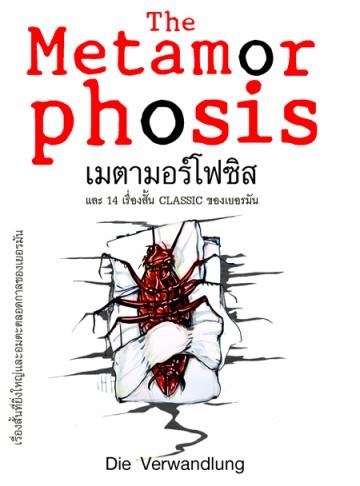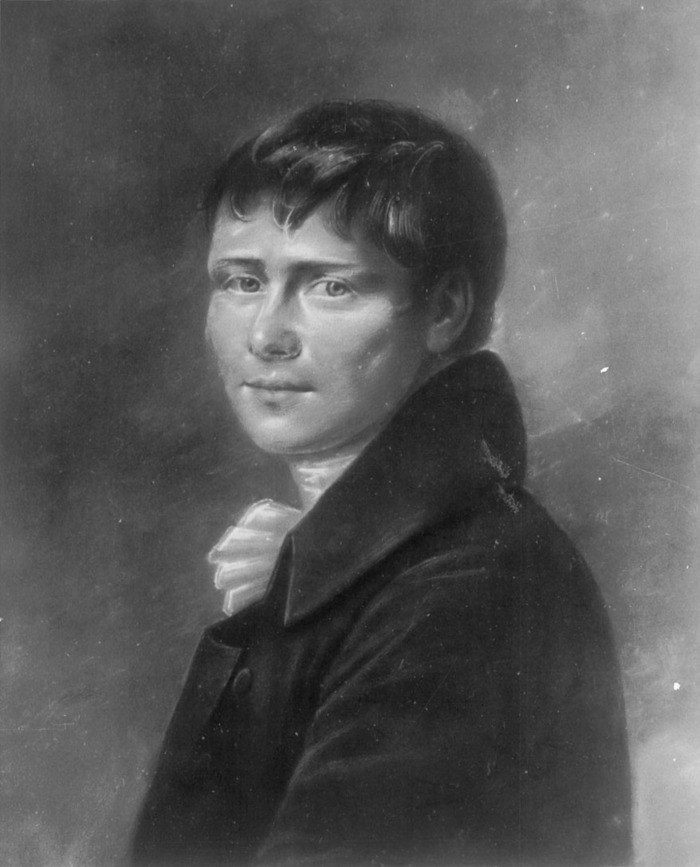
มนต์เสน่ห์ของเรื่องสั้นนั้นอยู่ที่มักจะจบแบบพลิกความคาดหมายหรือจบแบบทิ้งให้คิด มีเหตุการณ์หลักเพียงเหตุการณ์เดียว โครงเรื่องเดียว ฉากและจำนวนตัวละครน้อย จำนวนหน้าก็น้อย บางเรื่องก็มีเพียงแค่ คน ของ โวล์ฟกัง บอร์เชิร์ท หนึ่งในเรื่องสั้นที่เป็นอมตะตลอดกาลของเยอรมันในหนังสือชุดนี้ เมตามอร์โฟซิส และ 14 เรื่องสั้น CLASSIC ของเยอรมันได้รวมเอาผลงานนักเขียนที่มีชื่อเสียงระดับโลก ซึ่งอยู่ระดับต้นๆ ของประเทศ ผลงานทั้งหมดแปลจากต้นฉบับภาษาเยอรมัน จากผู้เชี่ยวชาญด้านภาษาโดยเฉพาะ ผลงานเรื่องสั้น 15 เรื่องนี้ นอกจาก เมตามอร์โฟซิส ของฟรันซ์ คาฟคา ที่คนไทยรู้จักดีแล้วยังมีนักเขียนอีกหลายท่านที่น่าสนใจเป็นอย่างยิ่ง ซึ่งผลงานของพวกเขาล้วนเป็นที่เลื่องลือว่าต้องอาศัยความเข้าใจตัวบทและเบื้องหลังสังคมวัฒนธรรมอย่างลึกซึ้งในการที่จะเข้าถึงเนื้อหาที่ได้ถ่ายทอดออกมา และนี่คือมนต์เสน่ห์อย่างหนึ่งที่ผู้อ่านจะได้รับจากบทประพันธ์ประเภทเรื่องสั้นของชาวเยอรมันโดยแท้
Authors

Prague-born writer Franz Kafka wrote in German, and his stories, such as " The Metamorphosis " (1916), and posthumously published novels, including The Trial (1925), concern troubled individuals in a nightmarishly impersonal world. Jewish middle-class family of this major fiction writer of the 20th century spoke German. People consider his unique body of much incomplete writing, mainly published posthumously, among the most influential in European literature. His stories include "The Metamorphosis" (1912) and " In the Penal Colony " (1914), whereas his posthumous novels include The Trial (1925), The Castle (1926) and Amerika (1927). Despite first language, Kafka also spoke fluent Czech. Later, Kafka acquired some knowledge of the French language and culture from Flaubert, one of his favorite authors. Kafka first studied chemistry at the Charles-Ferdinand University of Prague but after two weeks switched to law. This study offered a range of career possibilities, which pleased his father, and required a longer course of study that gave Kafka time to take classes in German studies and art history. At the university, he joined a student club, named Lese- und Redehalle der Deutschen Studenten, which organized literary events, readings, and other activities. In the end of his first year of studies, he met Max Brod, a close friend of his throughout his life, together with the journalist Felix Weltsch, who also studied law. Kafka obtained the degree of doctor of law on 18 June 1906 and performed an obligatory year of unpaid service as law clerk for the civil and criminal courts. Writing of Kafka attracted little attention before his death. During his lifetime, he published only a few short stories and never finished any of his novels except the very short "The Metamorphosis." Kafka wrote to Max Brod, his friend and literary executor: "Dearest Max, my last request: Everything I leave behind me ... in the way of diaries, manuscripts, letters (my own and others'), sketches, and so on, [is] to be burned unread." Brod told Kafka that he intended not to honor these wishes, but Kafka, so knowing, nevertheless consequently gave these directions specifically to Brod, who, so reasoning, overrode these wishes. Brod in fact oversaw the publication of most of work of Kafka in his possession; these works quickly began to attract attention and high critical regard. Max Brod encountered significant difficulty in compiling notebooks of Kafka into any chronological order as Kafka started writing in the middle of notebooks, from the last towards the first, et cetera. Kafka wrote all his published works in German except several letters in Czech to Milena Jesenská.


The dramatist, writer, lyricist, and publicist Heinrich von Kleist was born in Frankfurt an der Oder in 1777. Upon his father's early death in 1788 when he was ten, he was sent to the house of the preacher S. Cartel and attended the French Gymnasium. In 1792, Kleist entered the guard regiment in Potsdam and took part in the Rhein campaign against France in 1796. Kleist voluntarily resigned from army service in 1799 and until 1800 studied philosophy, physics, mathematics, and political science at Viadrina University in Frankfurt an der Oder. He went to Berlin early in the year 1800 and penned his drama "Die Familie Ghonorez". Kleist, who tended to irrationalism and was often tormented by a longing for death, then lit out restlessly through Germany, France, and Switzerland. After several physical and nervous breakdowns, in which he even burned the manuscript of one of his dramas, Heinrich von Kleist reentered the Prussian army in 1804, working in Berlin and Königsberg. There he wrote "Amphitryon" and "Penthesilea." After being discharged in 1807, Kleist was apprehended on suspicion of being a spy. After this he went to Dresden, where he edited the art journal "Phoebus" with Adam Müller and completed the comedy "The Broken Pitcher" ("Der zerbrochene Krug") and the folk play "Katchen von Heilbronn" ("Das Käthchen von Heilbronn"). Back in Berlin, the one time Rousseau devotee had become a bitter opponent of Napoleon. In 1811, he finished "Prinz Friedrich von Homburg." Finding himself again in financial and personal difficulties, Heinrich von Kleist, together with his lover, the terminally ill Henriette Vogel, committed suicide near the Wannsee in Berlin in 1811. [From http://www.heinrich-von-kleist.com/]

Bertolt Brecht (born Eugen Berthold Friedrich Brecht) was a German poet, playwright, and theatre director. A seminal theatre practitioner of the twentieth century, Brecht made equally significant contributions to dramaturgy and theatrical production, the latter particularly through the seismic impact of the tours undertaken by the Berliner Ensemble—the post-war theatre company operated by Brecht and his wife and long-time collaborator, the actress Helene Weigel—with its internationally acclaimed productions. From his late twenties Brecht remained a life-long committed Marxist who, in developing the combined theory and practice of his 'epic theatre', synthesized and extended the experiments of Piscator and Meyerhold to explore the theatre as a forum for political ideas and the creation of a critical aesthetics of dialectical materialism. Brecht's modernist concern with drama-as-a-medium led to his refinement of the 'epic form' of the drama (which constitutes that medium's rendering of 'autonomization' or the 'non-organic work of art'—related in kind to the strategy of divergent chapters in Joyce's novel Ulysses, to Eisenstein's evolution of a constructivist 'montage' in the cinema, and to Picasso's introduction of cubist 'collage' in the visual arts). In contrast to many other avant-garde approaches, however, Brecht had no desire to destroy art as an institution; rather, he hoped to 're-function' the apparatus of theatrical production to a new social use. In this regard he was a vital participant in the aesthetic debates of his era—particularly over the 'high art/popular culture' dichotomy—vying with the likes of Adorno, Lukács, Bloch, and developing a close friendship with Benjamin. Brechtian theatre articulated popular themes and forms with avant-garde formal experimentation to create a modernist realism that stood in sharp contrast both to its psychological and socialist varieties. "Brecht's work is the most important and original in European drama since Ibsen and Strindberg," Raymond Williams argues, while Peter Bürger insists that he is "the most important materialist writer of our time." As Jameson among others has stressed, "Brecht is also ‘Brecht’"—collective and collaborative working methods were inherent to his approach. This 'Brecht' was a collective subject that "certainly seemed to have a distinctive style (the one we now call 'Brechtian') but was no longer personal in the bourgeois or individualistic sense." During the course of his career, Brecht sustained many long-lasting creative relationships with other writers, composers, scenographers, directors, dramaturgs and actors; the list includes: Elisabeth Hauptmann, Margarete Steffin, Ruth Berlau, Slatan Dudow, Kurt Weill, Hanns Eisler, Paul Dessau, Caspar Neher, Teo Otto, Karl von Appen, Ernst Busch, Lotte Lenya, Peter Lorre, Therese Giehse, Angelika Hurwicz, and Helene Weigel herself. This is "theatre as collective experiment [...] as something radically different from theatre as expression or as experience." There are few areas of modern theatrical culture that have not felt the impact or influence of Brecht's ideas and practices; dramatists and directors in whom one may trace a clear Brechtian legacy include: Dario Fo, Augusto Boal, Joan Littlewood, Peter Brook, Peter Weiss, Heiner Müller, Pina Bausch, Tony Kushner and Caryl Churchill. In addition to the theatre, Brechtian theories and techniques have exerted considerable sway over certain strands of film theory and cinematic practice; Brecht's influence may be detected in the films of Joseph Losey, Jean-Luc Godard, Lindsay Anderson, Rainer Werner Fassbinder, Nagisa Oshima, Ritwik Ghatak, Lars von Trier, Jan Bucquoy and Hal Hartley. During the war years, Brecht became a prominent writer of the Exilliteratur. He expressed his opposition to the National Socialist and Fascist movements in his most famous plays.